
Krutham (formerly Intellidex) brings extensive expertise in working on just energy transition (JET) initiatives with clients in banking, asset management, development institutions, philanthropy and policymakers. Krutham’s portfolio of projects include partnerships with organisations such as the Impacting Investing Institute, the Africa Climate Foundation, the Presidential Climate Commission, and the World Bank.
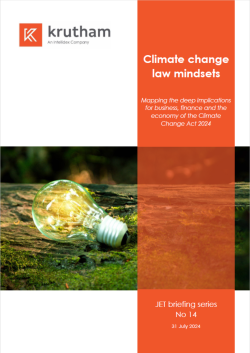
Climate change law mindsets
The Climate Change Act, which was signed into law on 23 July 2024, is South Africa’s first comprehensive legislation to guide the country’s transition to a low-carbon, climate-resilient economy. Once it comes into effect, it will establish a national agenda of necessary actions and empower the government to enforce ambitious measures across both the private sector and government departments. The question is if stakeholders fully grasp the level of change the bill implies and mandates over a sustained period.
This briefing document unpacks the next steps required to implement aspects of the Bill, the various stakeholders that will be affected and assesses various emerging challenges that still require attention. It also examines the Bill’s relationship to the Carbon Tax Act and international carbon trading (both of which will accelerate the Climate Change Act pathway) and unpacks the impact of these legislative developments on the banking sector in South Africa.
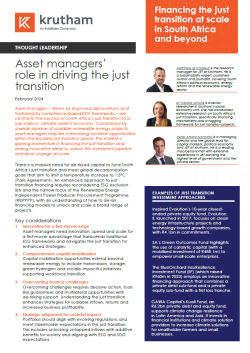
Asset managers’ role in driving the just transition
Asset managers are in an opportune position to assist South Africa in its transition to a low-carbon, climate-resilient economy. Constrained by a weak pipeline of scalable renewable energy projects, asset managers may be missing opportunities within the broader scope of the just transition. The renewable energy sector, though promising, is marred by a scarcity of scalable projects required for the transition, suggesting a need for a shift in approach.
As the market for financing the just transition gathers pace, critical opportunities are emerging for asset managers to lead the charge. By embracing innovative financing models and broadening their investment horizons, they can unlock a pipeline of investment that promises substantial returns and propels the country towards its ambitious climate goals.
This thought leadership paper highlights the challenges and opportunities at the intersection of investment and sustainability, advocating for a strategic re-evaluation that could redefine the role of asset managers in South Africa’s just transition.
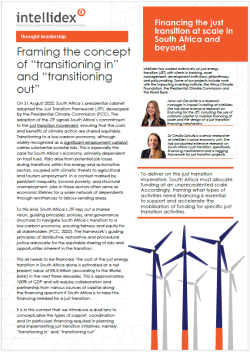
Framing the concept of “transitioning in” and “transitioning out
On 31 August 2022, South Africa took a monumental step in its climate action journey when the presidential cabinet embraced the Just Transition Framework (JTF), a creation of the Presidential Climate Commission (PCC). This adoption underlines not only South Africa’s dedication to the just transition movement but also its intent to equitably distribute the implications of climate action. Transitioning to a low-carbon economy offers tremendous potential for job creation; however, it poses considerable societal risks, especially for an economy like South Africa’s that leans heavily on fossil fuels. The transition threatens jobs in the energy, automotive, agriculture, and tourism sectors, sectors that many depend upon, given South Africa’s challenges with inequality, poverty, and structural unemployment.
The JTF aims to be a guiding light for South Africa as it treads the path to a low-carbon economy. The framework provides a comprehensive vision, set principles, policies, and governance blueprints to ensure a smooth transition. Its principles emphasise distributive, restorative, and procedural justice, highlighting the need for an equitable division of both the risks and the opportunities that the transition to greener energy sources will usher in.
The World Bank estimates the cost of South Africa’s just energy transition at R8.5-trillion in the next three decades. This calls for funding at an unprecedented scale. In our latest thought leadership piece, we frame what types of activities need financing to support and accelerate the mobilisation of funding for specific just transition activities.
As part of our work on JET, the African Climate Foundation commissioned us to assess how financing can be mobilised at scale for South Africa’s just transition. This resulted in a three-part series. Click on the links below to read the reports.
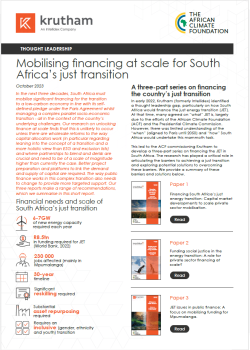
Mobilising financing at scale for South Africa’s just transition
In the next three decades, South Africa must mobilise significant financing for the transition to a low-carbon economy in line with its self-defined pledge under the Paris Agreement whilst managing a complex parallel socio-economic transition – all in the context of the country’s underlying challenges. Our research on unlocking finance at scale finds that this is unlikely to occur unless there are wholesale reforms to the way capital allocators work (in particular regarding leaning into the concept of a transition and a more holistic view than ESG and exclusion lists) and where partnerships to blend and de-risk are crucial and need to be of a scale of magnitude higher than currently the case. Better project preparation and platforms to link the demand and supply of capital are required. The way public finance works in this complex transition also needs to change to provide more targeted support. Our three reports make a range of recommendations, which we summarise in this short report.
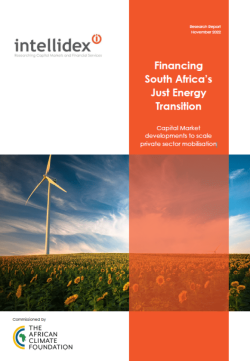
Financing South Africa’s Just Energy Transition
Capital Market developments to scale private sector mobilisation
This paper investigates the financing requirements for JET in emerging markets. In the paper we analyse how private sector financing can be catalysed and scaled in these markets, emphasising the need for innovation to support the readiness of capital markets. The paper also discusses the challenges of financing JET, and provides recommendations to address these challenges. Lastly, the paper looks into the significant financing needs of South Africa’s Just Energy Transition (JET), emphasising that such a transition could span 30 years and would necessitate investments ranging from R4tn to R8.5tn for South Africa.
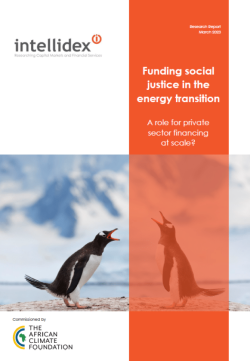
Funding social justice in the energy transition
A role for private sector financing at scale
In this paper, the second of three, we investigate the complex issues related to mobilising financing at scale for the social justice aspects of South Africa’s just energy transition. The paper seeks to explore how private, particularly commercial, capital can be deployed to fund activities, interventions and programmes that promote social justice in South Africa’s energy transition – the “J” in JET. This paper looks at the feasible types of investments and addresses the rationale for a greater role for the private sector in what is traditionally regarded as the primary domain of the state and non-profit sectors.
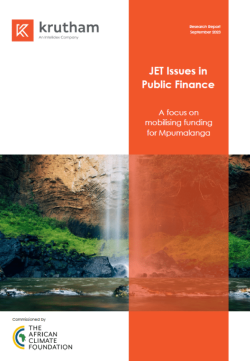
JET Issues in Public Finance
A focus on mobilising funding for Mpumalanga
This paper delves into the crucial yet often overlooked role of subnational governments, specifically provinces and municipalities, in the transition towards a just and sustainable economic framework. It emphasises the significance of these government levels in addressing location-specific challenges and in the effective implementation of complex programmes, particularly in financing. The paper proposes that enhancing the institutional strength of subnational governments, especially in Mpumalanga’s municipalities and key provincial departments, is essential for achieving a resilient and sustainable economic transition. It argues that current dysfunctions in subnational government hinder the necessary blended finance and cooperative partnerships. These partnerships are vital for mobilising private investment, support from Development Finance Institutions (DFIs), and philanthropic contributions alongside public sector resources to enable financing on a large scale. The paper also explores various policy instruments and funding mechanisms that can support local projects, stressing that the choice of policy instrument should align with the specific needs of the projects.